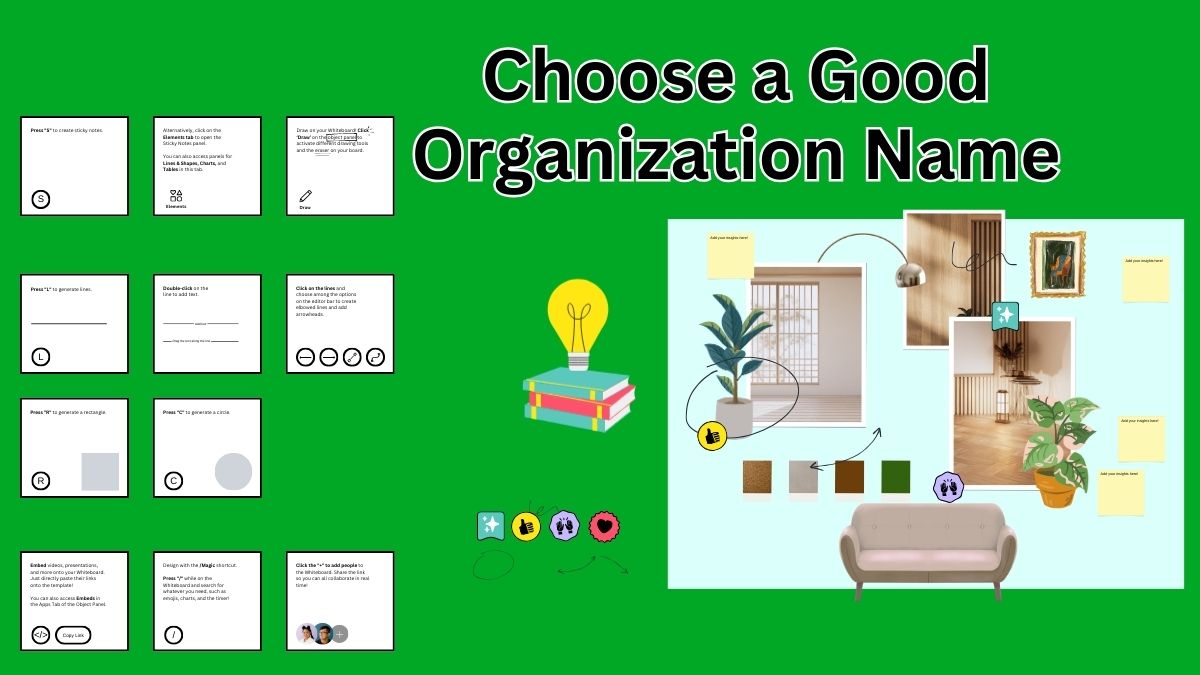A name is the first impression you make on your audience, and in the business world, it can be the difference between success and failure. A well-chosen organization name plays a crucial role in branding, marketing, and shaping the perception of your company. It reflects the vision, mission, and values of your organization while making a memorable impact on your target audience.
Here are 30 good organization names to inspire you:
30 Good Organization Names:
- EcoGen Solutions
- FutureWave Technologies
- Green Horizon Enterprises
- Core Innovations
- NextEra Consulting
- Visionary Ventures
- BrightPath Enterprises
- Pioneer Strategies
- TechTribe Solutions
- GlobalReach Industries
- Peak Performance Partners
- Infinity Labs
- SparkRise Group
- Urban Roots Collective
- QuantumShift Systems
- Momentum Innovations
- BlueSky Industries
- EdgeTech Solutions
- TrueNorth Enterprises
- Momentum Worldwide
- Evergreen Solutions
- Limitless Horizons
- Synergy Enterprises
- EpicQuest Ventures
- NexGen Creatives
- ApexPoint Global
- Stratosphere Solutions
- BoldBridge Consulting
- VisionPulse Innovations
- SolarFlare Technologies

Criteria for Choosing a Good Organization Name
When naming your organization, it’s important to consider several factors that will ensure your brand stands out and remains relevant in your industry. Below are key criteria to keep in mind:
1. Memorability:
A good organization name should be easy to remember. Aim for simplicity and clarity. Avoid using complex or difficult-to-pronounce words that could confuse potential customers or clients.
2. Relevance:
The name should reflect your organization’s mission, values, and industry. Whether you’re a tech company or a consulting firm, your name should give a hint of what you do. For example, names like EcoGen Solutions or SolarFlare Technologies are relevant to sustainability and technology.
3. Uniqueness:
Make sure your name stands out in a crowded market. Research other businesses in your industry to ensure your name doesn’t overlap with existing companies. A unique name helps to avoid confusion and ensures better searchability.
4. Scalability:
Consider how the name will fit as your business grows. Choose a name that can scale with your company as you expand into new products, services, or markets. A narrow, niche name might limit your growth potential.
5. Ease of Spelling and Pronunciation:
Your organization’s name should be easy to spell and pronounce. This is particularly important for word-of-mouth marketing and when people search for you online. A name that’s hard to spell can create unnecessary confusion.
6. Availability:
Check the availability of the domain name and social media handles related to your chosen name. In today’s digital age, having a consistent online presence is essential for brand identity. Ensure your name is available across all platforms to maintain consistency.
7. Emotional Appeal:
The name should evoke the right emotions in your target audience. Whether you’re aiming for trust, excitement, or innovation, your name should align with the feelings you want to create for your customers or clients.
8. Timelessness:
Choose a name that has lasting power and won’t feel outdated in a few years. Avoid trendy terms or buzzwords that might fall out of fashion, and instead opt for a name that has enduring relevance.
Why Choose a Good Organization Name?
Choosing a strong, memorable name for your organization is critical for several reasons:
1. Brand Identity:
Your name is an essential part of your brand identity. It helps define how people perceive your organization. A strong, meaningful name creates a lasting impression and can shape the overall perception of your products or services.
2. Marketability:
A good name is an effective marketing tool. It can generate curiosity, attract potential customers, and make your business more memorable. A catchy name is easier to advertise and promote across different channels.
3. Trust and Credibility:
A professional, thoughtfully chosen name conveys trustworthiness. A poorly chosen name can have the opposite effect, making your organization seem less reliable or less serious.
4. Competitive Edge:
In a competitive market, a strong name can give you an edge. It helps your organization stand out from the competition and ensures that you’re memorable to your audience, increasing your chances of success.
5. Brand Consistency:
Having a consistent and strong name across all touchpoints—website, social media, packaging—helps to establish brand authority. Consistency builds recognition and trust, making your brand more impactful over time.
Conclusion
Choosing a good organization name is not something to take lightly. It can significantly impact your brand’s visibility, success, and long-term growth. Consider all the criteria carefully, and remember that the name should reflect your business’s mission, values, and future potential. With the right name, your organization will not only stand out but also build trust and credibility with your audience.
Successful Organization Names and How They Benefited Their Organizations
A great organization name can have a huge impact on its success, helping establish brand recognition, build trust, and create emotional connections with customers. Below are examples of successful companies with well-chosen names and how those names have contributed to their success.
1. Apple
- Why It Works: The name “Apple” is simple, approachable, and memorable. It deviates from the traditional tech company names that are often filled with acronyms or complex terms. The simplicity of the name makes it easy to recall and pronounce globally.
- Impact: Apple’s name helped establish a friendly, innovative, and user-centric brand image. The association with the fruit symbolizes simplicity and freshness, making technology feel accessible to everyone.
2. Amazon
- Why It Works: Amazon is named after the vast Amazon River, implying something massive, expansive, and overflowing with resources. It also has a memorable, catchy ring to it.
- Impact: The name aligns perfectly with the company’s vision of becoming the “everything store,” a one-stop-shop for nearly any product. The name has played a key role in Amazon’s global dominance, as it evokes images of a limitless marketplace.
3. Tesla
- Why It Works: Tesla is named after Nikola Tesla, a pioneer in electricity and innovation. This name aligns with the company’s commitment to revolutionizing energy and transportation through cutting-edge technology.
- Impact: The name evokes a sense of technological prowess and innovation, appealing to eco-conscious consumers and those seeking futuristic solutions. Tesla’s name has significantly contributed to its image as a leader in electric vehicles and sustainable energy.
4. Google
- Why It Works: Google comes from the mathematical term “googol,” which refers to the number 1 followed by 100 zeros. This reflects the company’s mission to organize vast amounts of information and make it universally accessible and useful.
- Impact: The quirky, memorable name helped Google stand out in the crowded search engine market and has since become synonymous with online search. The name is fun and approachable, encouraging users to think of it as a tool for endless possibilities.
5. Nike
- Why It Works: Named after the Greek goddess of victory, Nike symbolizes power, speed, and triumph. The short, powerful name is easy to remember and has a strong, positive connotation.
- Impact: The name aligns perfectly with Nike’s mission to inspire athletes worldwide, making it a symbol of success and excellence. It’s a globally recognized brand, and the name contributes to its reputation for quality athletic wear and gear.
6. Spotify
- Why It Works: Spotify is a blend of the words “spot” and “identify,” reflecting the platform’s ability to identify and provide personalized music recommendations. The name is catchy, easy to pronounce, and memorable.
- Impact: The name helped Spotify become synonymous with streaming music. It conveys a sense of discovery and personalization, allowing users to feel like the service is tailored specifically to them. The name also works well globally, as it’s simple and easily adaptable in various languages.
7. Slack
- Why It Works: Slack is a casual, relaxed word that conveys ease and simplicity. It’s a term that hints at reducing unnecessary work and friction, which aligns with the company’s mission to streamline communication and collaboration within organizations.
- Impact: The name helped Slack carve out a unique identity in the crowded communication software market. It’s approachable and fun, which made it popular among startups and creative teams looking for an easy-to-use platform.
8. Uber
- Why It Works: “Uber” is a German word meaning “above” or “over.” The name signifies the idea of being above the competition and setting a new standard for transportation. It’s short, easy to say, and internationally recognizable.
- Impact: The name has helped Uber establish itself as a global leader in ride-sharing, conveying the notion of convenience and superior service. It’s a name that stands out and is memorable across different markets and cultures.
9. Airbnb
- Why It Works: “Airbnb” comes from “air mattress” and “bed and breakfast,” representing the company’s humble beginnings. The name reflects the idea of an affordable, personal place to stay, blending comfort and convenience.
- Impact: The name is memorable and speaks directly to the brand’s purpose: offering unique, home-like experiences to travelers. Airbnb’s name helped create an entirely new market of short-term rentals and experiences, reshaping the hospitality industry.
10. Zappos
- Why It Works: Zappos is derived from the Spanish word “zapatos,” meaning shoes. The name is fun, playful, and directly connected to the company’s original focus on selling footwear.
- Impact: The name Zappos contributed to the brand’s playful, customer-centric identity. It helped the company stand out in the e-commerce market by offering a memorable, easy-to-remember name and positioning itself as a leader in online retail.
Why Choose a Good Organization Name?
Choosing a good organization name isn’t just about finding something that sounds good. It’s about choosing a name that reflects your brand’s identity, goals, and target market. Here are a few key reasons why selecting the right name is crucial:
- First Impressions Matter: A strong name immediately tells your audience what your business is about and can spark curiosity or interest. It’s your first opportunity to make an impact.
- Brand Recognition: A memorable name sticks with people, making it easier for them to recall your business and spread the word. The more recognizable your name, the better your chances of success.
- Emotional Connection: A good name can create an emotional connection with your target audience. It can evoke positive feelings, trust, and loyalty, making customers more likely to engage with your brand.
- Competitive Advantage: A well-chosen name can differentiate you from competitors, especially in crowded markets. It helps you stand out and can make the difference between gaining and losing customers.
- Long-Term Value: A great name has staying power. It allows your organization to grow and adapt without losing relevance, making it a valuable asset for the future.
In conclusion, the names of successful organizations like Apple, Amazon, and Nike are not just catchy; they serve as strategic tools that help to build brand identity, recognition, and emotional connections with customers. By following the examples of these companies and considering the impact of a strong name, businesses can set themselves up for long-term success.
50 good organization names
Here are another 50 short organization names:
- Pulse
- Nexis
- Vero
- Vibe
- Vita
- Solis
- Nova
- Astra
- Zenith
- Frost
- Cleo
- Nimbus
- Lume
- Vex
- Echo
- Core
- Link
- Hive
- Vero
- Leap
- Edge
- Bright
- Kern
- Flick
- Orbit
- Shift
- Solace
- Vibe
- Blaze
- Pivota
- Zen
- Hexa
- Scope
- Luxe
- Moxie
- Flex
- Glint
- Luna
- Kite
- Flux
- Byte
- Trek
- Clip
- Thrive
- Zenon
- Spark
- Zest
- Flicker
- Vault
- Globe
These names are short, catchy, and easy to remember, making them great options for modern organizations.

